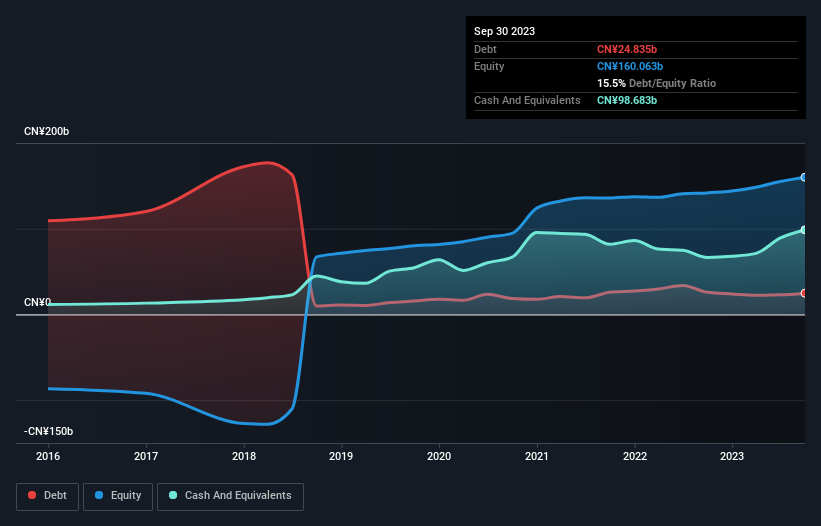
Some say volatility, rather than debt, is the best way to think about risk as an investor, but Warren Buffett famously said that 'Volatility is far from synonymous with risk.' It's only natural to consider a company's balance sheet when you examine how risky it is, since debt is often involved when a business collapses. We can see that Xiaomi Corporation (HKG:1810) does use debt in its business. But the real question is whether this debt is making the company risky.
When Is Debt Dangerous?
Debt assists a business until the business has trouble paying it off, either with new capital or with free cash flow. In the worst case scenario, a company can go bankrupt if it cannot pay its creditors. While that is not too common, we often do see indebted companies permanently diluting shareholders because lenders force them to raise capital at a distressed price. Of course, the upside of debt is that it often represents cheap capital, especially when it replaces dilution in a company with the ability to reinvest at high rates of return. When we think about a company's use of debt, we first look at cash and debt together.
See our latest analysis for Xiaomi
What Is Xiaomi's Debt?
As you can see below, Xiaomi had CN¥24.8b of debt, at September 2023, which is about the same as the year before. You can click the chart for greater detail. However, it does have CN¥98.7b in cash offsetting this, leading to net cash of CN¥73.8b.

A Look At Xiaomi's Liabilities
Zooming in on the latest balance sheet data, we can see that Xiaomi had liabilities of CN¥99.0b due within 12 months and liabilities of CN¥42.7b due beyond that. On the other hand, it had cash of CN¥98.7b and CN¥21.2b worth of receivables due within a year. So its liabilities outweigh the sum of its cash and (near-term) receivables by CN¥21.8b.
Since publicly traded Xiaomi shares are worth a very impressive total of CN¥283.6b, it seems unlikely that this level of liabilities would be a major threat. Having said that, it's clear that we should continue to monitor its balance sheet, lest it change for the worse. While it does have liabilities worth noting, Xiaomi also has more cash than debt, so we're pretty confident it can manage its debt safely.
On top of that, Xiaomi grew its EBIT by 62% over the last twelve months, and that growth will make it easier to handle its debt. The balance sheet is clearly the area to focus on when you are analysing debt. But ultimately the future profitability of the business will decide if Xiaomi can strengthen its balance sheet over time. So if you're focused on the future you can check out this free report showing analyst profit forecasts.
But our final consideration is also important, because a company cannot pay debt with paper profits; it needs cold hard cash. Xiaomi may have net cash on the balance sheet, but it is still interesting to look at how well the business converts its earnings before interest and tax (EBIT) to free cash flow, because that will influence both its need for, and its capacity to manage debt. Over the last three years, Xiaomi recorded free cash flow worth a fulsome 90% of its EBIT, which is stronger than we'd usually expect. That positions it well to pay down debt if desirable to do so.
Summing Up
We could understand if investors are concerned about Xiaomi's liabilities, but we can be reassured by the fact it has has net cash of CN¥73.8b. And it impressed us with free cash flow of CN¥32b, being 90% of its EBIT. So is Xiaomi's debt a risk? It doesn't seem so to us. There's no doubt that we learn most about debt from the balance sheet. But ultimately, every company can contain risks that exist outside of the balance sheet. For instance, we've identified 1 warning sign for Xiaomi that you should be aware of.
At the end of the day, it's often better to focus on companies that are free from net debt. You can access our special list of such companies (all with a track record of profit growth). It's free.
New: AI Stock Screener & Alerts
Our new AI Stock Screener scans the market every day to uncover opportunities.
• Dividend Powerhouses (3%+ Yield)
• Undervalued Small Caps with Insider Buying
• High growth Tech and AI Companies
Or build your own from over 50 metrics.
Have feedback on this article? Concerned about the content? Get in touch with us directly. Alternatively, email editorial-team (at) simplywallst.com.
This article by Simply Wall St is general in nature. We provide commentary based on historical data and analyst forecasts only using an unbiased methodology and our articles are not intended to be financial advice. It does not constitute a recommendation to buy or sell any stock, and does not take account of your objectives, or your financial situation. We aim to bring you long-term focused analysis driven by fundamental data. Note that our analysis may not factor in the latest price-sensitive company announcements or qualitative material. Simply Wall St has no position in any stocks mentioned.
About SEHK:1810
Xiaomi
An investment holding company, provides hardware and software services in Mainland China and internationally.
Flawless balance sheet with reasonable growth potential.


